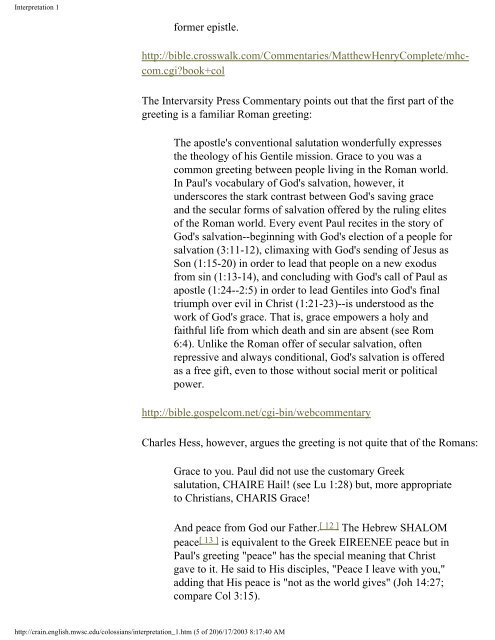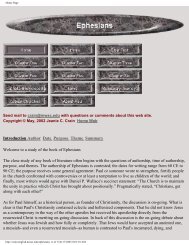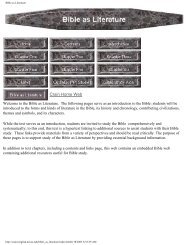Introduction to Colossians: Authorship, Date, Audience - Crain Home
Introduction to Colossians: Authorship, Date, Audience - Crain Home
Introduction to Colossians: Authorship, Date, Audience - Crain Home
Create successful ePaper yourself
Turn your PDF publications into a flip-book with our unique Google optimized e-Paper software.
Interpretation 1<br />
former epistle.<br />
http://bible.crosswalk.com/Commentaries/MatthewHenryComplete/mhccom.cgi?book+col<br />
The Intervarsity Press Commentary points out that the first part of the<br />
greeting is a familiar Roman greeting:<br />
The apostle's conventional salutation wonderfully expresses<br />
the theology of his Gentile mission. Grace <strong>to</strong> you was a<br />
common greeting between people living in the Roman world.<br />
In Paul's vocabulary of God's salvation, however, it<br />
underscores the stark contrast between God's saving grace<br />
and the secular forms of salvation offered by the ruling elites<br />
of the Roman world. Every event Paul recites in the s<strong>to</strong>ry of<br />
God's salvation--beginning with God's election of a people for<br />
salvation (3:11-12), climaxing with God's sending of Jesus as<br />
Son (1:15-20) in order <strong>to</strong> lead that people on a new exodus<br />
from sin (1:13-14), and concluding with God's call of Paul as<br />
apostle (1:24--2:5) in order <strong>to</strong> lead Gentiles in<strong>to</strong> God's final<br />
triumph over evil in Christ (1:21-23)--is unders<strong>to</strong>od as the<br />
work of God's grace. That is, grace empowers a holy and<br />
faithful life from which death and sin are absent (see Rom<br />
6:4). Unlike the Roman offer of secular salvation, often<br />
repressive and always conditional, God's salvation is offered<br />
as a free gift, even <strong>to</strong> those without social merit or political<br />
power.<br />
http://bible.gospelcom.net/cgi-bin/webcommentary<br />
Charles Hess, however, argues the greeting is not quite that of the Romans:<br />
http://crain.english.mwsc.edu/colossians/interpretation_1.htm (5 of 20)6/17/2003 8:17:40 AM<br />
Grace <strong>to</strong> you. Paul did not use the cus<strong>to</strong>mary Greek<br />
salutation, CHAIRE Hail! (see Lu 1:28) but, more appropriate<br />
<strong>to</strong> Christians, CHARIS Grace!<br />
And peace from God our Father. [ 12 ] The Hebrew SHALOM<br />
peace [ 13 ] is equivalent <strong>to</strong> the Greek EIREENEE peace but in<br />
Paul's greeting "peace" has the special meaning that Christ<br />
gave <strong>to</strong> it. He said <strong>to</strong> His disciples, "Peace I leave with you,"<br />
adding that His peace is "not as the world gives" (Joh 14:27;<br />
compare Col 3:15).






![[38cb1273][0][sourcelist][1][0] - Crain Home](https://img.yumpu.com/2168350/1/190x245/38cb12730sourcelist10-crain-home.jpg?quality=85)